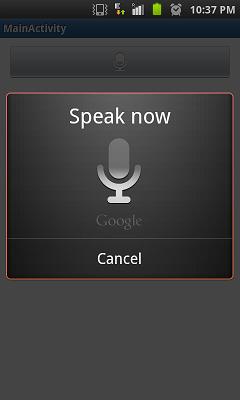Android有一个非常酷的特性很多开发者都还不知道。Any.DO之类应用的语音到文本转换功能很有创意。在现在Siri的世界里,语音指令是极其重要的。Android原生提供Speech To Text功能,为什么不把它用在我们的程序中!
我将会展示如何在程序中使用Android的Speech To Text API,现在开始写我们的demo程序。
Demo程序
这个程序很简单。他有一个Mic符号按钮。点击之后我们触发Android的Speech To Text意图(Intent)显示一个对话框来接收语音输入。输入的语音然后会被转换成文本并显示到一个text view中。
第一步:在Eclipse中创建基本的Android项目
在Eclipse中创建一个Hello World Android项目。打开
New > Project > Android Project,项目名填
SpeechToTextDemo,选择Android运行时2.1或sdk7。我给定了包名:
net.viralpatel.android.speechtotextdemo
做完上面的步骤,你就有了一个基本的Android Hello World程序
第二步:更改布局
在我们的demo中布局很简单。只有一个图像按钮来触发Speech to Text API和一个TextView来显示从语音转换过来的文本。
打开layout/main.xml并替换为下面的内容:
File: res/layout/main.xml
<LinearLayout xmlns:android="http://schemas.android.com/apk/res/android"
xmlns:tools="http://schemas.android.com/tools"
android:layout_width="fill_parent"
android:layout_height="wrap_content"
android:layout_above="@+id/textView1"
android:layout_toLeftOf="@+id/textView1"
android:gravity="center"
android:orientation="vertical" >
<ImageButton
android:id="@+id/btnSpeak"
android:layout_width="fill_parent"
android:layout_height="wrap_content"
android:layout_margin="10dp"
android:layout_marginRight="10dp"
android:layout_marginTop="10dp"
android:contentDescription="@string/speak"
android:src="@android :drawable/ic_btn_speak_now" />
<TextView
android:id="@+id/txtText"
android:layout_width="wrap_content"
android:layout_height="wrap_content"
android:layout_marginLeft="10dp"
android:layout_marginRight="10dp"
android:layout_marginTop="10dp"
android:textAppearance="?android:attr/textAppearanceLarge" />
</LinearLayout>
第三步:触发Speech to Text API的Android Java代码
打开SpeechToTextDemoActivity 类并替换为下面的代码:
File: SpeechToTextDemoActivity.java
package net.viralpatel.android.speechtotextdemo;
import java.util.ArrayList;
import android.app.Activity;
import android.content.ActivityNotFoundException;
import android.content.Intent;
import android.os.Bundle;
import android.speech.RecognizerIntent;
import android.view.Menu;
import android.view.View;
import android.widget.ImageButton;
import android.widget.TextView;
import android.widget.Toast;
public class MainActivity extends Activity {
protected static final int RESULT_SPEECH = 1;
private ImageButton btnSpeak;
private TextView txtText;
@Override
public void onCreate(Bundle savedInstanceState) {
super.onCreate(savedInstanceState);
setContentView(R.layout.activity_main);
txtText = (TextView) findViewById(R.id.txtText);
btnSpeak = (ImageButton) findViewById(R.id.btnSpeak);
btnSpeak.setOnClickListener(new View.OnClickListener() {
@Override
public void onClick(View v) {
Intent intent = new Intent(
RecognizerIntent.ACTION_RECOGNIZE_SPEECH);
intent.putExtra(RecognizerIntent.EXTRA_LANGUAGE_MODEL, "en-US");
try {
startActivityForResult(intent, RESULT_SPEECH);
txtText.setText("");
} catch (ActivityNotFoundException a) {
Toast t = Toast.makeText(getApplicationContext(),
"Opps! Your device doesn't support Speech to Text",
Toast.LENGTH_SHORT);
t.show();
}
}
});
}
@Override
public boolean onCreateOptionsMenu(Menu menu) {
getMenuInflater().inflate(R.menu.activity_main, menu);
return true;
}
@Override
protected void onActivityResult(int requestCode, int resultCode, Intent data) {
super.onActivityResult(requestCode, resultCode, data);
switch (requestCode) {
case RESULT_SPEECH: {
if (resultCode == RESULT_OK && null != data) {
ArrayList<String> text = data
.getStringArrayListExtra(RecognizerIntent.EXTRA_RESULTS);
txtText.setText(text.get(0));
}
break;
}
}
}
}
Android Speech to text Android API的核心是包
android.speech和类
android.speech.RecognizerIntent。我们触发一个意图(android.speech.RecognizerIntent)显示对话框来识别语音输入,这个Activity转换语音为文本并把结果传回我们正在调用的Activity。当我们调用android.speech.RecognizerIntent意图时,必须使用
startActivityForResult()来接听文本结果。
注意在上面的代码中我们是怎样创建并触发意图intent android.speech.RecognizerIntent的,同时使用.putExtra()方法添加了一个参数。调用RecognizerIntent时,必须提供
RecognizerIntent.EXTRA_LANGUAGE_MODE,在这里我们设置为
en-US。
由于我们的RecognizerIntent通过startActivityForResult()触发,我们重写了
onActivityResult(int requestCode, int resultCode, Intent data)方法来处理结果数据。RecognizerIntent会把语音转换为文本并把结果通过键RecognizerIntent.EXTRA_RESULTS作为ArrayList传回来。只有RESULT_OK返回时才会出现。我们只需要使用
txtText.setText()把从结果中拿到的文本设置到text view
texText中。
在这里值得注意的一件事是在不支持speech to text API的设备/Android版本中应该怎样处理。在这种情况下,当我们视图启动Activity时ActivityNotFoundException异常会被抛出。在上面的例子中,我们捕获了这个异常并使用Toast显示了一个提示信息“Opps! Your device doesn’t support Speech to Text”。
Android应用程序的屏幕截图
到这里就结束了! 在Android模拟器或真实设备上执行应用程序,将会看到下面的输出。




























 1083
1083

 被折叠的 条评论
为什么被折叠?
被折叠的 条评论
为什么被折叠?








